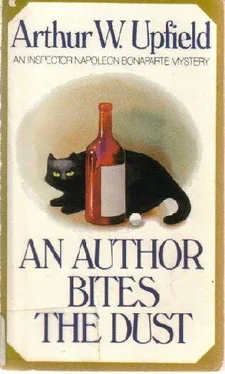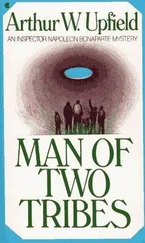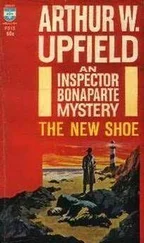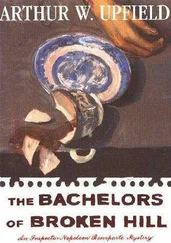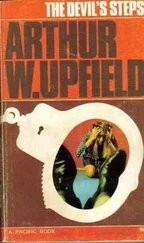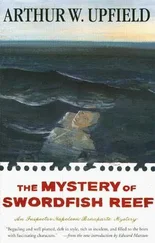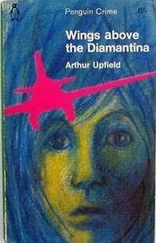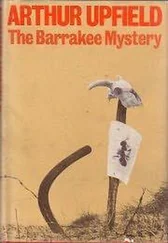Arthur Upfield - An Author Bites the Dust
Здесь есть возможность читать онлайн «Arthur Upfield - An Author Bites the Dust» весь текст электронной книги совершенно бесплатно (целиком полную версию без сокращений). В некоторых случаях можно слушать аудио, скачать через торрент в формате fb2 и присутствует краткое содержание. Жанр: Классический детектив, на английском языке. Описание произведения, (предисловие) а так же отзывы посетителей доступны на портале библиотеки ЛибКат.
- Название:An Author Bites the Dust
- Автор:
- Жанр:
- Год:неизвестен
- ISBN:нет данных
- Рейтинг книги:5 / 5. Голосов: 1
-
Избранное:Добавить в избранное
- Отзывы:
-
Ваша оценка:
- 100
- 1
- 2
- 3
- 4
- 5
An Author Bites the Dust: краткое содержание, описание и аннотация
Предлагаем к чтению аннотацию, описание, краткое содержание или предисловие (зависит от того, что написал сам автор книги «An Author Bites the Dust»). Если вы не нашли необходимую информацию о книге — напишите в комментариях, мы постараемся отыскать её.
An Author Bites the Dust — читать онлайн бесплатно полную книгу (весь текст) целиком
Ниже представлен текст книги, разбитый по страницам. Система сохранения места последней прочитанной страницы, позволяет с удобством читать онлайн бесплатно книгу «An Author Bites the Dust», без необходимости каждый раз заново искать на чём Вы остановились. Поставьте закладку, и сможете в любой момент перейти на страницу, на которой закончили чтение.
Интервал:
Закладка:
Ella Montrose sat next to him. She was fifty, dark and tragic. When in her twenties she had produced two novels; since then she had spent her time reviewing books and writing pars for the literary journals. She might have done better had she reared a family-better that than delving into mystic cults fromOdinism to Voodooism.
Next to Ella Montrose was Martin Lubers, short, dapper, alert and alive, with hazel eyes, clipped moustache, brown hair, and forty years behind him. Nancy wondered how he had managed to stay for a whole week, for he heaved grenades at those likely to differ from him.
She herself sat on Blake’s left, and beside her sat the cold, suave, white-haired Wilcannia-Smythe, reputed to have the most musical pen in Australia. He was slim and always elegant in dress, a rival and yet Mervyn’s firm friend for many years. Beyond him was Twyford Arundal, small, wispy, weak of eye and chin, but a poet of the top flight.
Last, but by no means least distinguished, was Janet Blake, who occupied the other end of the table. Who’s Who gave her age as forty-one, and people felt inclined to argue against that statement Janet Blake was large but notthick, her eyes were dark and restless. Her mouth was generous and yet firm-lipped, and her chin was square and strong. She seldom smiled, and Nancy Chesterfield decided that the house party had “taken a lot out of her”.
All in all, the dinner was a happy affair. The host talked well about nothing and was supported by his friends. Marshall Ellis told of famous novelists with whom he was well acquainted, and, provided one closed one’s eyes, his voice was a delight to the ear.
Subsequently the party gathered in the lounge, where Mrs Blake served coffee. It was then nine o’clock, and at half past nine Mervyn Blake suggested drinks. From then on, no one but Wilcannia-Smythe was worried by an empty glass. Everyone except Marshall Ellis smoked cigarettes, and he smoked cigar after cigar so that the atmosphere became foggily dense, though every door and window was open.
The conversation veered to the subject of Mervyn Blake’s lecture at the literary meeting that afternoon-“The Structure of the Novel”-and then Martin Lubers had to throw one of his grenades, the temptation being too strong to be resisted.
“Which is preferable,” he asked, “an imperfectly constructed skeleton covered with healthy flesh and vitalized with good, red blood, or a perfectly constructed skeleton covered with parchment and pigment with watered ink?”
“Why be anatomical?” complained Twyford Arundal, who was fast reaching the point when his voice failed “Don’t be difficult, my dear Martin.”
Marshall Ellis eased himself in his chair, lit another cigar, belched, and opened his mouth. Everyone but Nancy Chesterfield knew what threatened, but the menace was averted by the iconoclastic Lubers, who, being a Director of Talks on theA.B. C., was not a person to be ruthlessly crushed.
“You have been discussing the structure of the novel as though the novel is an established science,” he said. “No art can be a science, like ballistics or material stresses. Not once have you mentioned the vital essentials of fiction, inspiration, and imagination, and the ability to believe in what is imagined. Without these essentials, the perfectly constructed novel is merely a thing of words.”
Marshall Ellis’s cheeks were being puffed out and drawn in. He grunted to command attention, and Wilcannia-Smythe took up the challenge in time to thwart him.
“If we may assume, Lubers, that your preference is for the crooked skeleton covered with bulging fat, give us examples,” he urged.
“Very well, I will,” assented Lubers. “You, Blake, were stressing the importance of deliberate analysis and the even progress of pure drama, the novelist’s imagination to be subservient to the language he employs. Life is not like thatThere is no such thing as pure drama, any more than in reality there are human characters who are all angel or all devil. A novel ought to be a slice of life, up in one chapter and down in another, its characters angels in the morning and devils in the evening. It’s the pictures painted by the words that count, not the words that paint the pictures. The story must be paramount, and in my opinion Clarence B. Bagshott can tell a story better than some of your lauded novelists.”
The room became quiet. It was as though Martin Lubers had praised theDecameron at a Methodist Conference. Then Blake spoke, slowly, giving exaggerated space between each word.
“My dear man, don’t be a complete ass,” he said. “We were discussing the novel and novelists, and you bring forward the atrocious efforts of a ‘whodunit’ writer.”
“All right, Blake, we’ll pass him by,” said the unabashed Lubers. “What of the novels of I. R. Watts? No one can say he does not turn out an excellent novel. He writes with astonishing vividness and achieves remarkable suspense.”
“Melodramatic trash,” averred Mervyn Blake, his eyes glinting.
“They sell, anyway,” Lubers argued. “And I’ve seen high praise of them inoversea journals. Watts gives an important something in addition to entertainment, and that addition is knowledge of history and of people.”
“But Lubers, Watts’s work lacks rhythm, and the writing is far from good.” Mervyn Blake’s lip lifted in a sneer, and he said, “It could never be claimed that I. R. Watts is a contributor to Australian literature-or any other. Our sole interest at the moment is Australian literature, and the influence we may exert upon its development.”
Nancy Chesterfield observed that Blake was becoming extremely angry. He emptied his glass and almost filled it with neat brandy, drank most of that and continued, apparently knowing he was the elected champion, his words falling like small hammers upon cement.
“Your taste in broadcast talks is excellent, Lubers,” he said, “but your judgment of literature is, shall we say, peculiar. You wireless people are like the film people. You cannot divest your minds of the idea that popularity spells artistic quality. There was never yet a best-seller that had any claims to being good literature, literature as understood by the cultured. We are interested, Lubers, in Literature with a capital L, not commercial fiction that receives the approval of the common herd.”
“Well, before I go up in smoke and flame, I’m firing my last shot,” Lubers growled. “The greatest best-seller of all time, you will agree, is the Bible, read by the cultured and the illiterate all over the world. The common herd can and does appreciate literature provided it says something worth hearing with the mind.”
Twyford Arundal opened and moved his mouth to mock but not the tiniest sound issued from it. Then he fell off his chair and his forehead came in contact with the edge of a stool. When he had been picked up and put back again, the powder for Blake’s next shot was drenched with the general sympathy for poor Twyford Arundal, who continued to work his mouth without result.
The unpleasantness had cleared by half past eleven, when Ella Montrose said she was going to bed. Everyone seemed ready to retire, and the party moved into the hall and broke up. There Blake asked Wilcannia-Smythe to lock the back door after he left the house for his writing-room.
“Be sure to go to bed, Mervyn,” Ella Montrose advised, and softly laughed. “Don’t go making love over the fence to the extraordinary Miss Pinkney.”
“I would much prefer, my dear Ella, to cut Miss Pinkney’s scrawny throat,” he countered.
Nancy Chesterfield slept soundly all through the night until half past seven the next morning when the maid brought her early tea. She was returning from the bathroom when she met Ella Montrose. Ella was whimpering like a child recovering from punishment. Nancy asked her why she was so upset, but could obtain no explanation, and she took the distraught woman to her own room, where she pacified her.
Читать дальшеИнтервал:
Закладка:
Похожие книги на «An Author Bites the Dust»
Представляем Вашему вниманию похожие книги на «An Author Bites the Dust» списком для выбора. Мы отобрали схожую по названию и смыслу литературу в надежде предоставить читателям больше вариантов отыскать новые, интересные, ещё непрочитанные произведения.
Обсуждение, отзывы о книге «An Author Bites the Dust» и просто собственные мнения читателей. Оставьте ваши комментарии, напишите, что Вы думаете о произведении, его смысле или главных героях. Укажите что конкретно понравилось, а что нет, и почему Вы так считаете.
